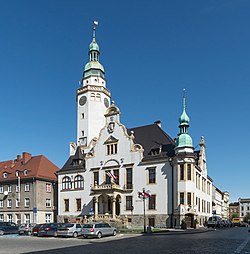Top Qs
Timeline
Chat
Perspective
Ziębice
Place in Lower Silesian Voivodeship, Poland From Wikipedia, the free encyclopedia
Remove ads
Ziębice [ʑɛmˈbit͡sɛ] (German: Münsterberg) is a town in Ząbkowice Śląskie County, Lower Silesian Voivodeship, in south-western Poland.[2] It lies on the Oława River, approximately 16 km (10 mi) east of Ząbkowice Śląskie and 59 km (37 mi) south of the regional capital Wrocław. It is the seat of the administrative district (gmina) called Gmina Ziębice.
You can help expand this article with text translated from the corresponding article in Polish. (March 2009) Click [show] for important translation instructions.
|
As of 2019, the town has a population of 8,708.
Remove ads
History
Summarize
Perspective
The area became part of the emerging Polish state under its first historic ruler Mieszko I in the 10th century. The town was first mentioned in 1234 under the Old Polish spelling Sambice. This Slavic town was probably destroyed in 1241 during the Mongol invasion of Europe. According to records, a new town under German town law, called Munsterberck (1253) or Sambiz videlicet Munsterberg (1268). The town became home of a German-speaking population as the result of Ostsiedlung.[3]
As a result of the fragmentation of Poland, it formed part of the duchies of Silesia until 1290, Świdnica until 1322, and afterwards it was the capital of a small eponymous duchy, remaining under the rule of the Piast dynasty until 1521. In 1344, a court was established in the town by the Piast dukes.[4]
In 1521 it passed to the Podiebrad family, and in 1569 it passed to the kings of Bohemia. The town suffered in the Hussite Wars and Thirty Years' War, and in 1643, it was hit by an epidemic.[4] In 1742, it became part of Prussia and was the capital of Kreis Münsterberg. In 1842, the town had a population of 3,946, predominantly Catholic by confession.[4] In 1871, it became part of the German Empire along with the bulk of Silesia. Following Germany's defeat in World War II, in 1945, it became again part of Poland and its German population was expelled in accordance with the Potsdam Agreement.
Remove ads
Culture
Ziębice hosts Poland's only Museum of Home Appliances.
Sports
The local football club is Sparta Ziębice. It competes in the lower leagues.
Notable people
- Karl Denke (1860–1924), serial killer
- Edyta Górniak (born 1972), singer
- Janusz Kamiński (born 1959), cinematographer
- Karl Weigert (1845–1904), pathologist
Twin towns – sister cities
Gallery
- Gothic Saint George Basilica
- Medieval Paczkowska Gate
- Piast Eagle monument
- Ziębice Sugar Refinery
References
External links
Wikiwand - on
Seamless Wikipedia browsing. On steroids.
Remove ads








